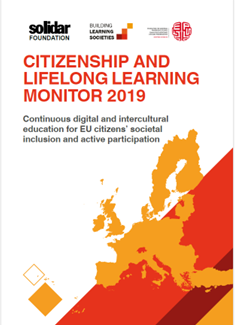Ups and Downs in the Updated Skills Agenda
The European Commission presented on 1 July the awaited Updated Skills Agenda, which aims at identifying the skills that Europeans’ should be equipped with, to meet the requirements of changing societal and working environments over the next five years. At times when nothing less than defining a new normality is needed, the Skills Agenda is a piece of policy-making that can facilitate equal access to the attainment of skills and competences that Europeans will need to navigate changing societies.
In this frame, SOLIDAR Foundation welcomes the acknowledgement by the Commission of the need to address urgently the digital divide and lack of digital skills of Europeans, a need that we recommended to tackle also in the latest edition of the Citizenship and Lifelong Learning Monitor. It is also to be appreciated that more attention is now given overall to the need to ensure equal opportunities to all, thus to address the regional as well as generational stark discrepancies and, more at large, the unequal access to opportunities that persist in the EU, and which worsen existing divides among Europeans.
However, we regret to see that the Agenda remains growth-oriented. The pandemic has shown more unmistakably than ever that our societies need to define and achieve a new normality, based on sustainability and resilience. The scale of the change that we need to achieve requires a paradigm shift, which must be backed by democratic support to be successful. As the Citizenship and Lifelong Learning Monitor shows, Europeans are not ready yet to be active citizens in an increasingly digital and global environment. Therefore, while re- and up-skilling schemes aimed at improving employability are certainly crucial for making the labour market accessible to all, we also need to look at citizens’ skills and competences globally, to ensure that people in the EU are equipped with the competences that enable them to be aware citizens in changing societies.
For this reason, we welcome the action point Skills to support the twin transition (action 6), which has multi-folded aims. First, it focuses on creating a taxonomy of skills for the green transition, which would be a relevant support for education providers and learners to navigate the green transition. Moreover, it aims to develop a European competence framework on education for climate change, environmental issues, clean energy transition and sustainable development – which will spell out the different levels of green competence, making also the case for Global Citizenship Education. With this said, the digital skills component of the action is quite unclear and it remains to be further analysed in relation to the Digital Education Action Plan.
As part of the European Education Area, we also welcome the introduction of activities for teachers – Action 7, helping to address the shortage of STEM teachers in EU countries and regions. We appreciate the combination of transversal skills (critical thinking, teamwork, problem solving) with the entrepreneurial ones. The foreseen strategic framework for the recognition of transversal skills to support validation practitioners in Europe is a positive development, as well as the mobilisation of resources to support validation of transversal skills by employers and employment services. This will include exploration of EU-wide online courses and related micro-credentials for validation practitioners, and establishment of a network of validation pioneer organisations that can share best practices.
Skills for Life is an action designed to support the achievement of the Agenda 2030. However, the Skills Agenda dedicates only a few lines to it, so it remains to be seen how it will be meant for implementation. Non-formal and life-wide learning for the achievement of SDGs is crucial for our societies, for becoming sustainable.
The provision of these competences largely depends on Civil Society Organisations through non-formal education activities. Nevertheless, the Agenda acknowledges only partially this role, while it stresses the role for public-private partnerships. It is the case for actions such as Pact for Skills,Proposal for a Council Recommendation on VET, European Universities Initiative and STEM. Although the private sector should definitely be called upon for mobilising resources related to the up- and re-skilling of workers, the twin transition should not be organized by profit-driven organisations. We trust the public authorities to rely on multi-stakeholder and not-for-profit partnerships, for the attainment of new competences and skillsto be inclusive.
The growth-driven approach that underpins the whole Skills Agenda is short-sighted and concerning. Moreover, in order to ground the targets of the Skills Agenda into national plans, it is necessary to establish a clearer link with the European Semester.
The Updated Skills Agenda reflects the objectives of the European Pillar of Social Rights and it clearly aims at combining it with the achievement of the Agenda 2030, but our societies will be sustainable only by shifting the focus away from growth and towards sustainable development.



